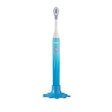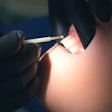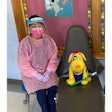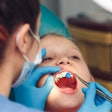
Children may be picking up on their parents' fear of visiting the dentist, according to newly released findings from a Delta Dental survey. However, dental practices can take certain steps to make both children and parents feel more at ease.
Between December 2014 and January 2015, Delta Dental polled more than 1,300 parents of children ages 12 and younger. The findings showed that nearly half (48%) of parents say they feel nervous before a dental visit. About the same number of children (47%) share the sentiment.
"I think nervousness is frequently transferred from the parents or siblings to the child," stated Bill Kohn, DDS, Delta Dental Plans Association's vice president of dental science and policy, in a press release. "A lot of their experience going into something new is influenced by their parents or siblings or even friends sometimes, if they're older."
Dentists can ease children's fears
 Bill Kohn, DDS, vice president of dental science and policy, Delta Dental Plans Association. Image courtesy of Delta Dental.
Bill Kohn, DDS, vice president of dental science and policy, Delta Dental Plans Association. Image courtesy of Delta Dental.The possibility of a painful visit was the top reason (54%) that children are anxious about a trip to the dentist, according to the survey findings. Other reasons include the appointment taking too long (28%), the possibility of additional dental work (25%), and not liking the dentist (17%).
Dr. Kohn said it is important for dentists and parents to be upfront about the experience. For example, telling children that they won't have any pain may be unrealistic, so he recommends focusing on other aspects of the visit.
"It's common for parents to think they're being proactive by telling kids it's not going hurt, but often that wasn't even something the child was thinking about," Dr. Kohn said. "Instead, it's better to talk about positive things, like the dentist is going to count their teeth."
Furthermore, dentists can make the experience better for their younger patients by having things for kids to do while they're waiting. Adding office decorations or activities familiar to children can help ease kids' anxiety (Dr. Robert Wade also has written about this engagement strategy in a recent column on DrBicuspid.com).
"Often in a pediatric office, it's decorated to appeal to a child," Dr. Kohn said. "They'll frequently have entertainment and distractions for kids of different ages to keep them entertained."
Having a conversation about the experience upfront between the dentist and parents also is helpful, so that both parties know what to expect during the visit.
"Some dentists would like the parent to be back with the child, some won't. It's important for the parent to decide what they would like and discuss with the dentist beforehand," Dr. Kohn told DrBicuspid.com.
Dr. Kohn also stressed the importance of getting kids into the dentist's office when they're young. Doing so allows children to become familiar with the experience from an early age and enables dentists to educate their parents. The American Academy of Pediatric Dentistry recommends that children first see the dentist by age 1.
Be upfront about procedures to help adults
Fear of visiting the dentist doesn't stop as people get older. The survey found that more than half of adult mothers (55%) and many fathers (40%) reported being nervous before a dentist appointment.
It's important for practitioners to be upfront about the costs of dental work, according to Dr. Kohn. Money is a big stressor for patients, especially families, and patients may be worrying about how much a procedure will cost.
Practitioners can also help patients of all ages have a better visit with the dentist by explaining the procedures in detail. This may help patients know what is going on and ease any anxieties.
"If it's an adult, take the time to explain things in plain language that's easily understandable," he said. "No one likes to be surprised."
Finally, one of the most important things dentists can do to help all their patients is to be friendly and open.
"Having a friendly, open staff and office atmosphere is important," Dr. Kohn said. "[As is] being open, honest, and nonthreatening, and most dentists do a good job of that."



















